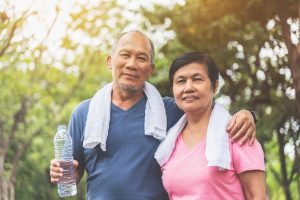 When astronauts are in space, they are weightless. Gravity disappears, and they float around their spacecraft. It sounds fun, but it isn’t great for their bones.
When astronauts are in space, they are weightless. Gravity disappears, and they float around their spacecraft. It sounds fun, but it isn’t great for their bones.
Unloading your bones (taking stress off them) comes with consequences. Their bones become thinner, and their immune system gets weaker.
Advertisement
This can happen to sedentary individuals on earth too. The more time a person spends sitting, the less stress they are putting on their bones.
When bones are under pressure from walking, standing, jumping, climbing, or weight training, they get stronger. They are forced to adapt to the pressure and respond.
Bone strength naturally decreases with age, and activity typically does too. Reduced activity is not the primary cause of lost bone density in older folks, but it can certainly speed up the process. Low bone density and weak bones can lead to osteoporosis and a greater risk for fractures.
New research published in nature suggests that regular physical activity can stimulate bone cell regeneration and ultimately lead to thicker and stronger bones.
So, one thing is clear: putting stress on your bones can help keep them stronger and prevent degeneration. But are there specific exercises you should be doing?
Advertisement
The answer is yes. The exercise needs to be load-bearing. It doesn’t mean you need to be lifting heavy weights, but it does mean that exercises like swimming, aquafit, cycling, or yoga won’t be much benefit. Walking, running, and resistance training are beneficial.
Aside from load-bearing exercise, other things you can do to promote bone health include:
- Eating a variety of vegetables
- Consuming protein
- Eating high-calcium foods throughout the day
- Getting adequate vitamin D
- Avoid super low-calorie or restrictive diets
When you take stress off your bones, they get weaker. This can exacerbate age-related bone loss and boost the risk for osteoporosis. Fight back by spending more time up and moving if you can.
